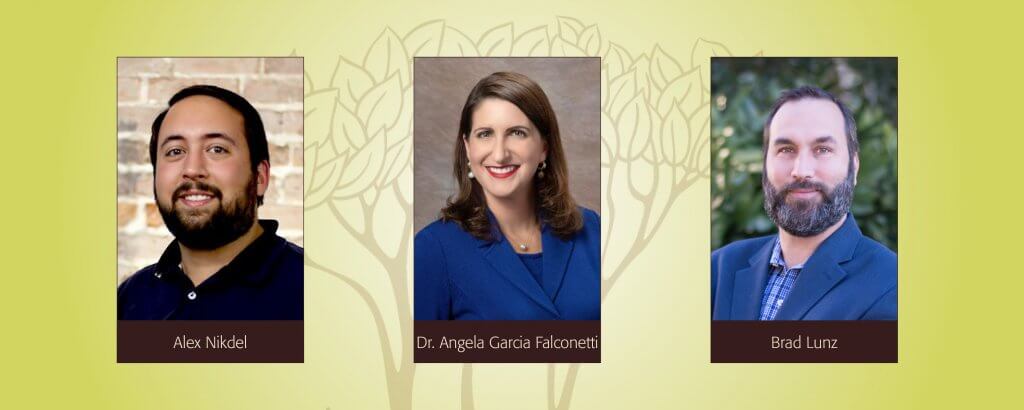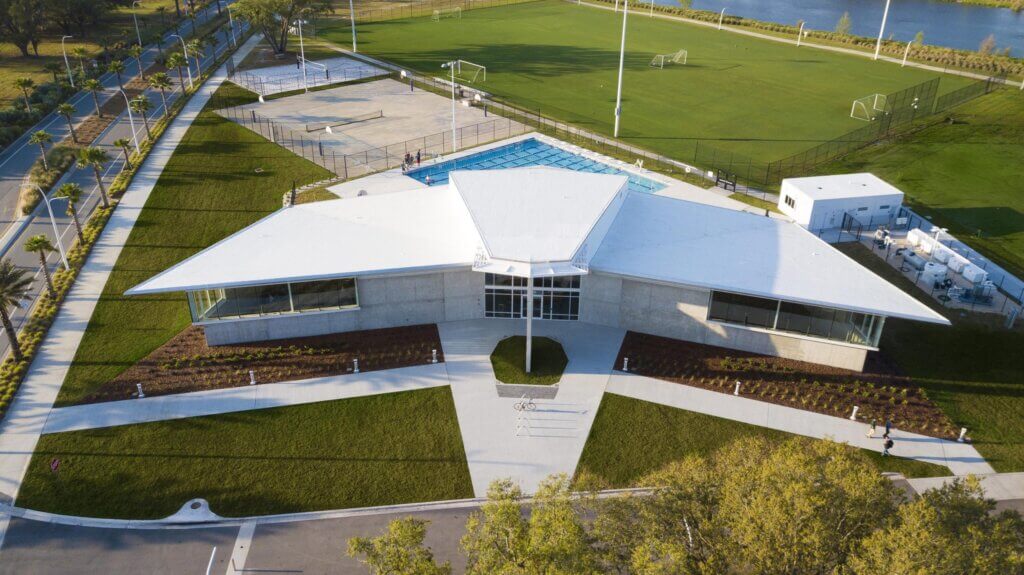CFDC Quarterly Leadership Roundtable: Workplace of the Future
By Emily Rogers, Emily Rogers Consulting + Coaching
The workplace is rapidly evolving and for most organizations, work will never look the same as it did before COVID-19. Organizations around the globe are determining what their workplaces of the future will look like in the new normal and there is a vast spectrum of approaches being considered from 100% virtual, to 100% in the office, to countless hybrid variations of both virtual and in-person.
Recently I had the opportunity to sit down with three local leaders to discuss how their organizations have weathered the storm created by the pandemic. Each of these leaders became more intentional about employee engagement and utilized innovative technology solutions to support productivity and enhance the employee experience.
Join me as I talk with Brad Lunz, President— The Lunz Group, Dr. Angela Garcia Falconetti, President – Polk State College and Alex Nikdel, President – CNP about how the past year of change and transition has helped their organizations emerge stronger, better, and in a unique position to grow in the post-pandemic economy.

Tell us what you are planning for your workplace of the future and what’s most important to you as you consider workplace environment for your employees.
Brad: It’s interesting that you’re asking an architect a question about planning workspace, but I’m not actually approaching it as a spatial problem. We are trying to create opportunities for meaningful engagement and quality collaboration and minimize the emphasis on the quantity of time spent in the office. We want to make sure that as we go forward, we adapt to each individual and build guidelines that meet their needs rather than creating wide-sweeping workplace policies. We are assessing the needs of each employee, determining their best workflow, and then re-organizing teams to maximize the strengths of each member.
Angela: Students are Polk State’s number one priority, and in responding to the pandemic our faculty and staff reinvented the manner in which we serve students during a very short timeframe. The following are three critical areas respective to the workplace environment that will continue to be employed by the College: First, innovative practices and working to eliminate the digital divide for students will continue to be central to our mission. Polk State will continue offering Chromebooks to students for online and hybrid classes, and student services on an online platform. Second, online and hybrid (part online/part in person) courses will continue to be enhanced. Faculty will benefit from additional professional development opportunities in this regard. Third, selective business operations, such as contract approvals, were enhanced through technology and will remain in a remote format.
Alex: We went fully remote last March, and it went off without a hitch. Our productivity was not impacted, but we did notice that employees tend to have a strong preference for either working in the office or working completely from home. To accommodate these preferences, we are planning to adopt a hybrid approach where employees come into the office a few days a week and work from home a few days a week. We’ll have set meetings where all team members will be expected to attend in person, but we can maximize our physical office space by utilizing a few “floater” desks instead of designated offices.
Tell us about the technology advancements your organization made during COVID, if any, and how those investments will continue to enable your people and your organization to thrive in the future.
Brad: We had already invested heavily in Microsoft Teams, the collaborative software, and in video conferencing tools so we had the infrastructure to support remote work and global client communication. We found that in a fully remote work environment, Teams became a tool for additional project documentation and more importantly, a social platform. Our employees started to engage in new ways by having virtual coffee breaks or happy hours. We’ve had employees introduce their pets during meetings, my own daughter has popped into my webcam to meet many team members and clients, and you see folks checking in on each other in ways I had not seen before the pandemic. These connections become deeply personal and in a creative field that helps build trust and deepen relationships.
Angela: Technological changes have been critical to the success of our COVID response. We transitioned to a new learning management system prior to the pandemic that is an online teaching portal that facilitates the learning process for our students. This platform, called Canvas, has a mobile-friendly app that has been a lifeline for students without access to laptops or desktops. We engaged an outside firm to support faculty in proctoring examinations for online and hybrid courses to ensure the integrity of the education we provide. We also established multiple Wi-Fi hotspots throughout the College and Polk County to enable students without internet service to connect to their Polk State classes, learning resources, and student services.
Alex: We were already enabled with collaboration technology like Slack and Zoom pre-COVID and our VPN allows remote access to the local server, but we did find ourselves purchasing tools like additional monitors to facilitate home office use of company laptops. We’ve certainly become more skilled at using our existing tools for a variety of new tasks and our employees have gotten creative with how they use technology to do their jobs when they are not physically in the office.
Describe the approaches to employee engagement that you’ve adopted over the past year. What are you going to continue to carry forward? Are there any new approaches that you’re considering for the future as it relates to employee engagement?
Brad: From a leadership perspective, one of the things I started almost immediately when we were remote, was a daily memo. It was short and not heavily edited. The topics varied based on what was going on that day and I tried to share my personal experiences, like mountain biking along with company information. My goal was to be transparent about the uncertainty and try to give certainty to the things I knew we could control. My employees wouldn’t trust anything less than 100% authenticity and this situation demanded it. Recently, we gathered everyone together at a local park to celebrate the past year and focus on wellness. It gave us a chance to just be together and we even got do some mountain biking as a group! My goal for employee engagement is to build relationships that go beyond work and to find ways to connect and relate that extend past the duties of the job.
Angela: We hosted several virtual town hall meetings with all employees. We also held a virtual professional development day in 2020 and 2021 to provide a forum for faculty and staff to exchange best practices. Our students developed a virtual student life center that held more than 125 virtual events for students to keep them engaged.
Alex: We’ve had to be much more intentional about our employee interactions. With the entire company working remotely, chance meetings in the hallway or breakroom were not going to happen. We asked all managers to conduct a weekly one-on-one with their direct reports to check in and give each employee a forum for providing feedback on how they were progressing. We transitioned our weekly agency-wide stand-up meeting to a virtual format. I think that continuity has helped everyone stay connected and given us a place to celebrate wins, exchange information and the space to talk about issues employees are
As you and your teams have adapted to the disruption caused by Covid-19 and will need to continue to adapt as we transition into the next normal, in what ways have you been shifting your approach to hitting your organizations KPI’s and goals?
Brad: We have started to categorize our KPIs based on our core values. Instead of only looking at things quantitatively, we’ve started to assess qualitative value as well. We identified six core values and we ask ourselves questions that relate directly to those values like – What is the value proposition we’re giving to our client? What is the value we bring to a project? How are we measuring that? These questions, not just the accounting ratios, help us determine our success. Resiliency is a core value for us and we believe that demonstrating our gratitude to team members for their contributions through recognition, compensation, and support is a big part of creating a resilient team.
Angela: We have three main goals for our students as we move forward – engendering retention, supporting completion, and celebrating achievement. My goal is to continue to exercise flexibility and support for our students as we help them accomplish their goals of graduating at Polk State, transferring to another institution, and securing meaningful employment.
Alex: We made a shift a few years ago to be more focused on KPIs and started gathering the data required to design the metrics needed to analyze our performance. This served us well in a virtual environment where there wasn’t an opportunity to exchange information throughout the day. We’ve been much more intentional about communication and identifying the correct audience for each phase of a project. Our Project Management team has been an integral part of our success by helping us deploy the right resources, at the right time, to the right tasks while team members are working remotely.
As the pace and unpredictability of change continue to escalate, and you prepare your operations and teams for a future crisis, what are some lessons you’ve learned over the last year that will serve you in the future?
Brad: The two lessons that resonate with me over the last year are – trust your instincts and create certainty through transparency. I’ve learned that as a leader I can’t be anyone other than who I am. I must have confidence in my ability to lead, even if the situation is uncertain. If I can communicate with my team honestly and share what I know and don’t know, even in a very fluid situation, trust is established. With trust, your team will push through and persevere through any situation.
Angela: The challenges and experiences through the COVID-19 public health emergency have reinforced the criticality of a strong team whose members are committed to accomplishing Polk State’s goals through effective collaboration. I truly care for the entire Polk State community and am fortunate to be surrounded by a supportive team of faculty, staff, District Board of Trustees, and Foundation Board of Directors. In addition, our COVID-19 Response Team, comprised of representatives from all sectors of the College, will continue to guide our response and recovery from impacts of the pandemic, and we will continue to communicate consistently and transparently with our College community as we move forward and in all future crisis situations.
Alex: Looking back over the circumstances of the last year, our lessons learned center around frequent intentional communications and being more process driven. Amid uncertainty and confusion, clear communication on a regular basis reassured our team members and helped them to focus on the organizational mission. Additionally, while team members were working remotely, having well defined and repeatable processes helped to ensure quality and consistency in our product. These processes allowed us to remain flexible as our customer base shifted to larger clients because we were able to utilize the same processes and just scale up to meet their requirements.
Emily Rogers, Founder & CEO of Emily Rogers Consulting + Coaching and a 2021 Lakeland Chamber of Commerce Businesswoman of the Year Finalist, is an executive coach, business consultant, and retreat facilitator, she strategically advises and supports individuals and organizations in growing and realizing their full potential in purposeful and balanced ways. You can connect with her at http://emilyrogers.com



